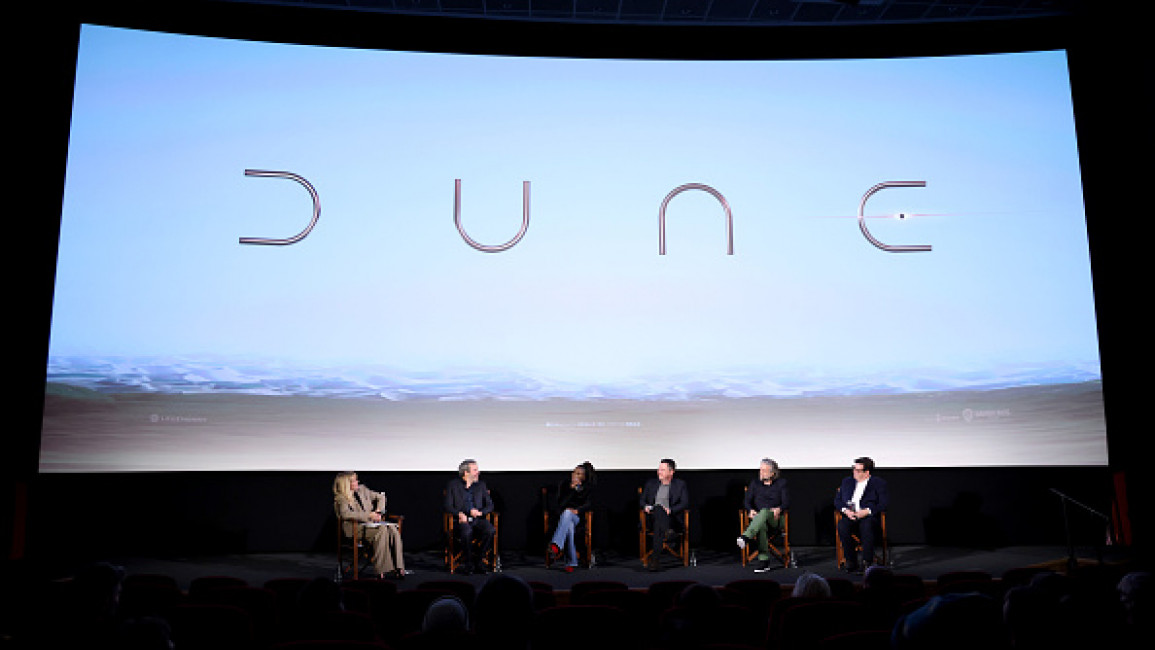Newly released trailer for Dune: Part Two is full of references to MENA culture
Warner Bros has released a massive trailer for Dune: Part Two, the middle film of the three-part adaptation of Frank Herbert's 1965 novel.
The trailer gives a sneak peek into the visual world created by director Denis Villeneuve, and follows Paul Atreides' journey to unite with the Fremen people of the desert planet Arrakis to win an intense war that is about to start with House Harkonnen.
Some new faces join the cast of the first Dune film, including Oscar-nominee Austin Butler (Elvis), whose casting was announced last year. Although heavily criticised for the lack of MENA representation, the Hollywood cast for part two still does not include Arab actors in key roles.
Herbert, the author of Dune, often acknowledged the influence of Islam and Middle Eastern culture on his work, particularly Dune. The Fremen group is inspired by the culture of the Amazigh people of Algeria and Morocco. The name is even borrowed from the Amazigh language.
Watching this bit repeatedly
— Raul Muad'Dib Atreides (@Luharchowdary) June 29, 2023
Aah voice entanna gonthu poyedhi
" ya dib hya chouhada " https://t.co/Co5mShAgPU pic.twitter.com/zrKeRaQgVF
But the influence of the Middle Eastern region in the film goes beyond just the Fremen and extends to the entire setting.
You’ll hear Gurney Halleck, played by Josh Brolin, referring to a Mahdi: a religious saviour. The IMDb logline of the movie goes as follows: "A boy becomes the Messiah of nomads on a desert planet that has giant worms that protect a commodity called Spice. Spice changes people into travellers, mystics, and madmen. What price will he pay to become the new ruler of their universe?” Spice in the plot is a metaphor for oil, echoing the occupation of Iraq by drawing parallels to the occupation of the planet Arrakis through changing a few vowels.
Fans of the movie might remember the famous line "Yahya al-Shuhada’" (Long live the fighters!) from the 1984 movie adaptation of Dune. Just a few years before the publication of the first "Dune" book, Arab and Amazigh freedom fighters returned to Algeria after its independence from the 130-year occupation by France. Several newspapers reported that Algerian leaders were greeted in the streets with the same chant, which is more accurately translated as "long live the martyrs" in Arabic. It’s not clear yet from the trailer weather the line is going to be shouted in Arabic in part-two.
YouTubers spotted that the flag the Fremen are waving in the trailer may be a pan-Arab flag consisting of red, green, white, and black. Some even interpreted it as "the flag of the Arab revolt." Some of the scenes were filmed in Jordan, particularly Wadi Rum, Wadi Araba, and other parts of the country's southeastern desert.
Spoiler alert: The trailer opens with Paul and Shawnee, and it seems like their relationship will be a central focus of this movie. Their bond has affected every charter throughout the thousand-year timeline of the original novel. Could marriage or a serious partnership be on the horizon? We can't tell just yet!
Dune part one surpassed $400 million at the global box office, a milestone that only a few films have achieved. This sets the bar a bit too high for Part Two.
But let's not forget the journey of the novel itself. Despite winning the most prestigious science fiction awards, the Nebula and Hugo, it took years for Dune to gain commercial success. It gradually found its audience as the concept of global transformation became more popular. Fifty years later, the novel was deemed the "best-selling sci-fi novel in the world," with over 12 million copies sold.
Can Part Two live up to the expectations? We'll find out when it’s out in theatres on November 3rd.

![Bahrain [getty] Bahrain [getty]](/sites/default/files/styles/image_330x185/public/media/images/5F28B59A-942B-4B6A-A5A8-09D476D1E68D.jpg?h=d1cb525d&itok=NJNXWh5z)

